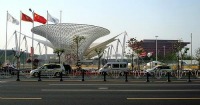The Diplomatic Component of Expos
If we define public diplomacy as communication between a national government and foreign public, Expo 2010 Shanghai is certainly the most extensive public diplomacy event to date. In a 1,304 acre site and during six months, national governments from 189 countries will communicate directly with an estimated 70 million visitors.
Frequently, Expos appear together with the Olympic Games and FIFA World Cup as mega-events of global scale. However, Expos stand out for having a formal diplomatic component that other megaevents lack. Unlike the Olympic Games and FIFA World Cup, Expos directly involve national governments from the host and participating countries.
Expos are regulated by the Convention Relating to International Exhibitions, an international treaty ratified by 157 countries in 1928. The International Exhibitions Bureau (Bureau International des Expositions or BIE) is the intergovernmental organization created to supervise the observance of the Convention. In its General Assembly, representatives of each member country take decisions on a vast array of issues around Expos.
The diplomatic component of Expos manifests in different ways. For example, invitation by the host country and subsequent confirmation of participation by guest countries is done exclusively through diplomatic channels.
Then, the national government of each participating country must accredit a Commissioner General of Section to officially represent it before the government of the host country on all issues related to Expo, following an ad hoc diplomacy scheme. Before and during the Expo, heads of state and government visit the site to nurture diplomatic relations between countries.
It is also important to consider that the public diplomacy scheme of the Olympic Games and FIFA World Cup is diametrically opposed to that of Expos. Whereas in the former the host country projects itself abroad, mainly through broadcasting (inside-outwards), in Expos participating countries present themselves to the public of the host country through experiential learning (outside-inwards).
What is the importance of international governments’ awareness of the diplomatic component of Expos? Fundamentally, it is to create and fully use opportunities to approach a foreign public with clear and appropriate messages.
In spite of the 159-year long history of Expos and the 82 years of the Convention’s existence, a considerable number of governments continue to neglect both the diplomatic component and public diplomacy potential provided by Expos. An illustrative case is the United States, which despite being the most highly anticipated pavilion by the Chinese public, did not receive any monetary support from the U.S. Government.
All the pavilion’s expenses have been paid by private companies, despite the fact that international legislation strictly limits commercial promotion in official pavilions.
One of the most notable examples of successful public diplomacy at this year’s Expo is Canada, whose government accredited Mark Rowswell as Commissioner General of Section. Mr. Rowswell is a Canadian citizen who might not be well known in his own country, but is extremely popular as a freelance performer in China by the name of “Dashan”. Canada gave ad hoc diplomatic status to a celebrity who is able to build a natural bridge with the Chinese public, a decision that is probably the result of the experience accumulated during the eight years in which the Canadian Government established its permanent agency and because of the active participation of Canadian delegates in the BIE.
Flags and China Pavilion at 2010 Expo. Photo courtesy of Cesar Corona © 2010
Expo 2010 Shanghai will remain open until October 31. After it closes, the tradition will continue with Expo 2012 Yeosu (Korea) and Expo 2015 Milan (Italy). Some national governments have already started working under the premise that Expos offer unique opportunities for massive and direct communication with the public of the host country. Those that don’t acknowledge this fact will miss an unparalleled opportunity to engage in the world’s biggest public diplomacy event.
Tags
Issue Contents
- The View From CPD May/June 2010
- The 2010 Shanghai Expo, Cultural Diplomacy, and a Tale of Three States: China, North Korea and the US
- The Diplomatic Component of Expos
- CPD’s Shanghai Expo Blogs and Video Conversations
- The USA Pavilion’s Human Element
- PD and the Gaza Flotilla
- Review: The United States and Public Diplomacy: New Directions in Cultural and International History
Most Read CPD Blogs
-
March 22
-
February 22
-
February 23
-
March 4
-
March 19
Visit CPD's Online Library
Explore CPD's vast online database featuring the latest books, articles, speeches and information on international organizations dedicated to public diplomacy.










Add comment